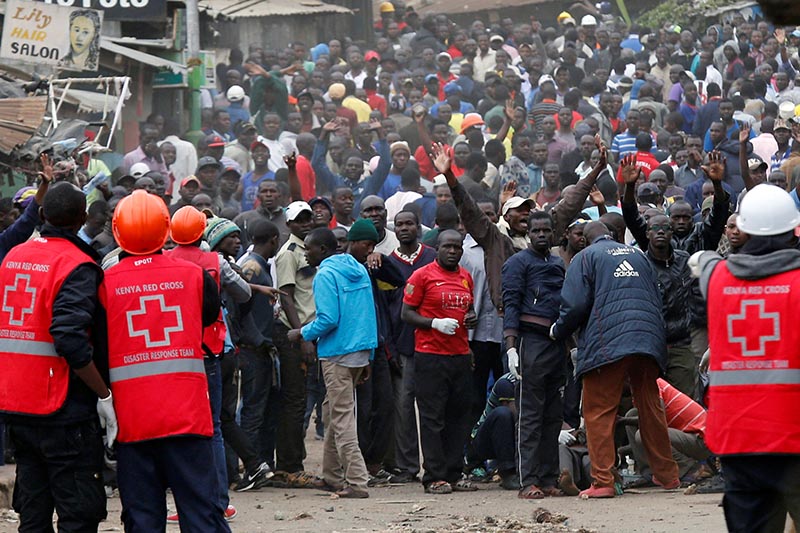2 killed in Kenya protests after president wins 2nd term
NAIROBI: Kenyan police shot and killed two people during riots by opposition supporters after President Uhuru Kenyatta was declared the winner in elections overshadowed by fraud allegations, authorities said Saturday.
The deaths occurred on the outskirts of Kisumu, a city where opposition leader Raila Odinga has strong support, according to Leonard Katana, a regional police commander. Another five people were injured by gunfire in Kisumu, Katana said.
Also Saturday, Kenyan police opened fire to disperse opposition protesters who blocked roads and set up burning barricades in a slum in Nairobi, the capital. Associated Press photographers saw police charging demonstrators and firing live rounds and tear gas in the Mathare area, as well as similar scenes in Kibera, another Nairobi slum.
Most of the country of 45 million people was calm the day after the election commission announced that Kenyatta, whose father was Kenya's first president after independence from British colonial rule, had won a second, five-year term. In a victory speech, Kenyatta said he was extending a "hand of friendship" to the opposition, which alleged that the election commission's database had been hacked and results were manipulated against Odinga.
Kenyatta won with a decisive 54 percent of the vote to nearly 45 percent for Odinga, but the bitter dispute over the integrity of the election process tempered what many Kenyans had hoped would be a celebration of democracy in a regional power known for its economic promise and long-term stability.
The unrest also exposed divisions in a society where poverty and corruption at top levels of government have angered large numbers of Kenyans, including those who have been protesting in the slums and see Odinga as a voice for their grievances.
Adding to the rift is ethnic loyalty. Kenyatta is widely seen as the representative of the Kikuyu people, the country's largest ethnic group, while Odinga is associated with the Luo group, which has never produced a head of state.
But reconciliation efforts, the introduction of a progressive constitution in 2010 and an intense security operation during the recent election period have helped to ward off the kind of ethnic violence after the 2007 election in which more than 1,000 people were killed. Odinga ran unsuccessfully in that election; he also lost the 2013 vote to Kenyatta and took allegations of vote-tampering to Kenya's highest court, which rejected his case.
Recalling its failed legal challenge in 2013, the opposition has said it will not go to court again. Its top leaders have, so far, refrained from publicly calling for mass protests.
Catholic leaders on Saturday appealed for calm and asked security forces to exercise caution during protests.
"We appeal to them to restrain themselves from using excessive force in handling crowds," said John Oballa Owaa, vice chairman of the Kenya Conference of Catholic Bishops. "No life should be lost because of an election."
The bishop said any dispute over the election should be resolved peacefully and by "legal norms as provided in the constitution."






